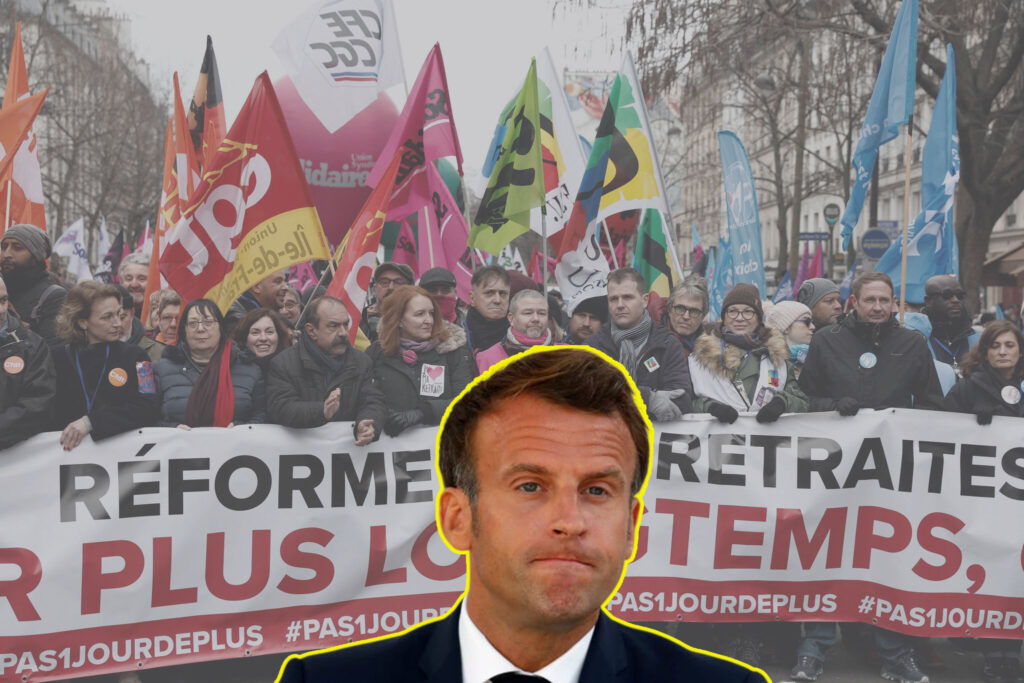
A reform of France’s pension system which is set to push the minimum retirement age from 62 to 64 has resulted in large-scale protests in France. Almost 1.27 million French workers are rallying against the new pension plan of the Macron administration. Such is the impact of the protests that transport services have been heavily impacted. Schools and energy sectors are also facing disruptions. Polls show that most French people disapprove of Macron’s plan to raise the pension age from 62 to 64. With support from a majority of the French population, more than a million people began to protest against the pension reforms on January 19, 2023. Reports suggest that this is the biggest-ever protest witnessed in France after the exit of Nicolas Sarkozy.
What does the French Government say?
French President Macron in support of the reform says this move has been brought about so that people can work more and transform the society and the welfare system of France. Macron argues that this move is essential when compared with other European nations and has been made with the intention to save and protect the French state pension system. The government argues that the pension scheme guarantees the future financing of the pension system, which has been forecasted to tip into a deficit in the next few years. Furthermore, the government says its proposals are necessary to keep the pension system solvent as the life expectancy of the French has grown and birth rates have declined. Prime Minister, Élisabeth Borne, has further said that raising the pension age to 64 is “not negotiable” while Interior Minister, Gérald Darmanin, says protestors and other opposition are only looking to spoil the country and are blindly defending “idleness and champagne socialism!”
What do the Protestors and the Opposition say?
Macron’s political opponents and trade unions argue that the current system is balanced and there is no need to change. The street protests have been backed by the opposition, mainly the left party, which says the new pension plan is both regressive in terms of quality of life and economically unfair—meaning it is fundamentally at odds with their vision. The opposition has been backed by the fact that this month, the country’s independent Pension Advisory Council told parliament that “pension spending is not out of control and is relatively contained.” The opposition says that his observation makes the changes invalid. The left-wing party, the France Unbowed (LFI) says, “It’s the unfairness that is most shocking; it’s always the working classes which end up paying most.”
Challenges for Macron
The new pension reform is yet to be introduced in parliament. The challenge for his party is that they don’t hold a majority in the parliament as they lost the majority in the 2022 parliamentary election. The Left-wing opposition has submitted more than 7,000 amendments to the draft legislation in an attempt to slow its path through the parliament. This is a challenging time for President Macron as he faces multiple problems in various spheres of domestic politics where his party (the Renaissance) is getting tough competition from the opposition, from both the Left and the far Right parties.
On the economic front, he needs to carry the burden of rising inflation and depleting industrial output. Further adding to Macron’s woes is the green-subsidy policy of the USA which has ramifications for Europe, particularly France. As a result, French President Macron and German Chancellor Scholz have opposed the USA move as it hampers European economic output. Macron is bogged down not just by domestic problems but also by the international issues of energy and food insecurity caused by the Ukrainian war. France being a pivotal member of NATO and Macron being a prominent leader of Europe, the war has posed tough questions for him. However, the crisis also gives him an opportunity to find solutions and further cement his place both in France and across Europe as a tall leader.
(The author is a post-graduate student in International Relations at Kalinga university, Raipur. The opinions expressed are the author’s own)
Aayush Pal is a freelance writer on contemporary geopolitical developments. The views expressed in his work are entirely his own.
